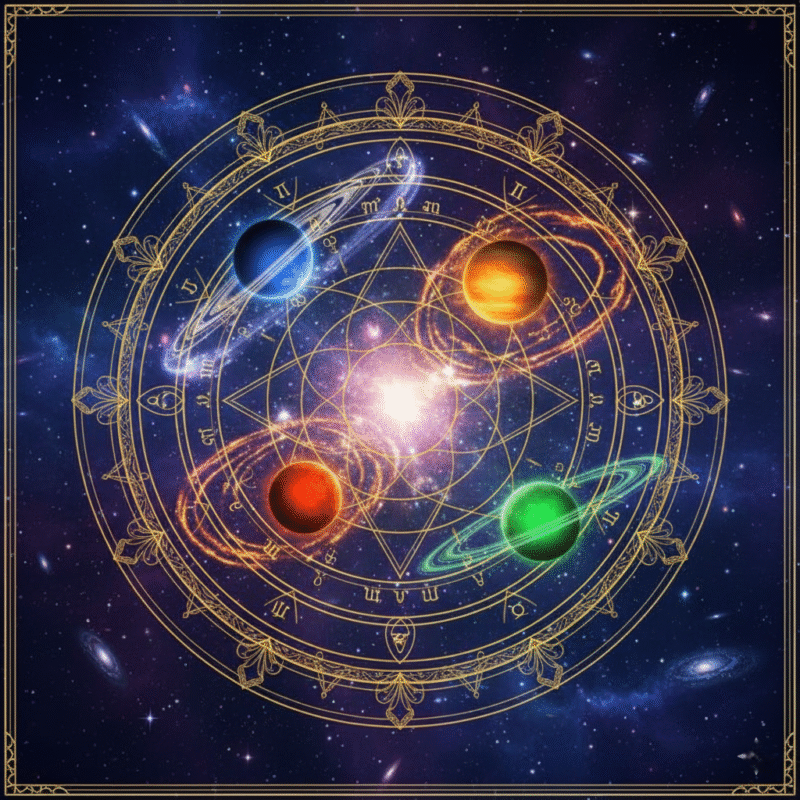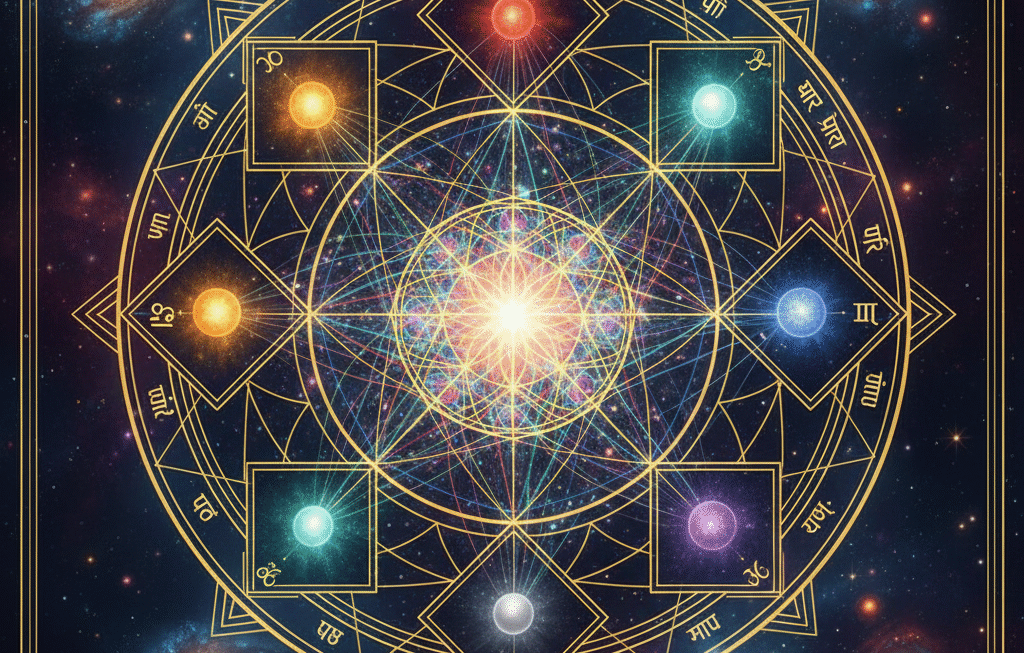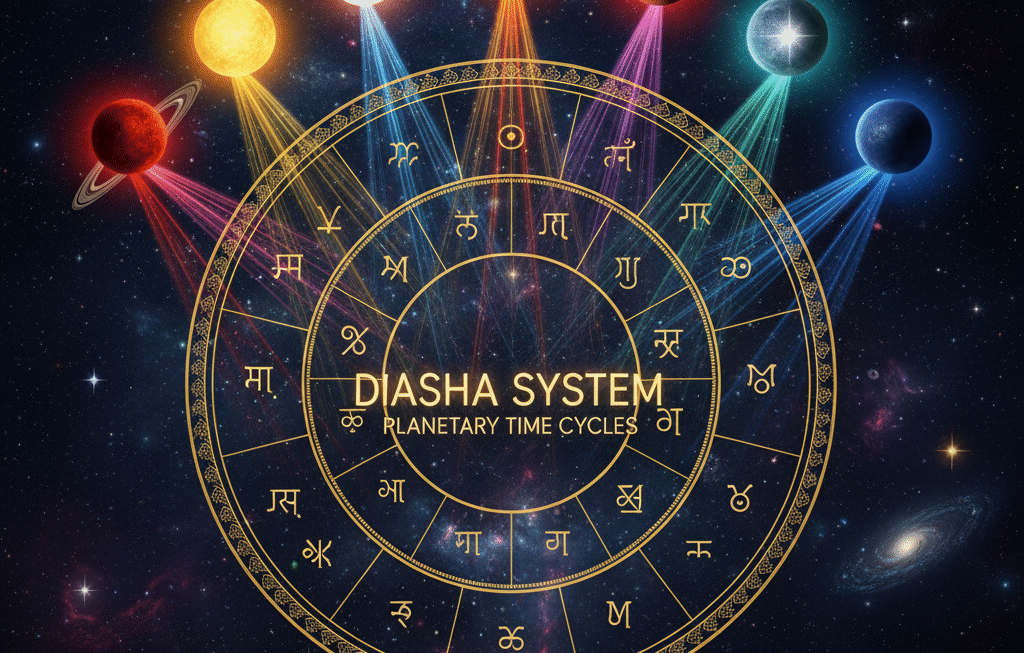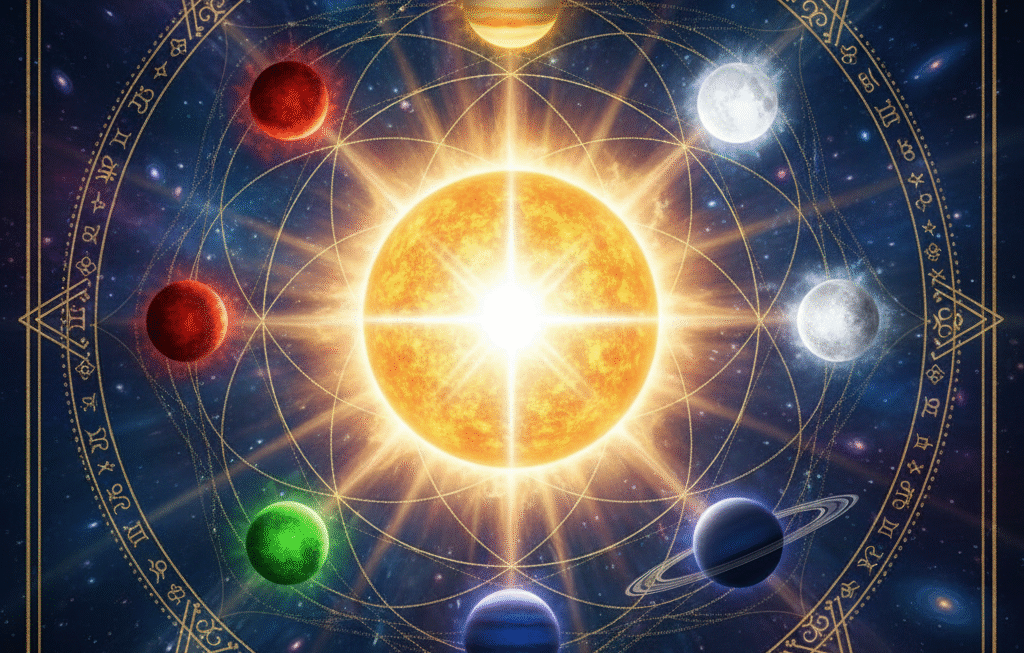If you’ve opened your Vedic birth chart (Kundli) and noticed a few planets marked as retrograde, you might have felt confused — do they move backward? Are they bad? Or do they hold some secret power? In retrograde planets Vedic astrology, planets appear to move backward, symbolizing deep introspection, karmic lessons, and intensified energies.
In Vedic astrology, retrograde planets (Vakri Graha) are among the most intriguing and misunderstood elements. This guide will help you understand what retrograde means, how it influences your life, and how to interpret it in your own birth chart.
What Does Retrograde Mean in Vedic Astrology?
(Keywords: retrograde meaning vedic astrology, vakri graha)
Opinion: In Vedic Astrology, when a planet appears to move backward in the sky from Earth’s perspective, it’s called Vakri — retrograde.
Reason: This is not an actual backward motion. It’s an optical illusion caused by the relative speeds of Earth and the planet involved. However, this apparent reversal has deep symbolic meaning — it represents internalization, reconsideration, and reassessment of the planet’s natural significations.
Example: For instance, when Mercury is retrograde, communication, travel, and decision-making — all Mercury-governed areas — may experience delays or require re-evaluation.
Restatement: Thus, a retrograde planet doesn’t become weak — rather, it becomes more powerful inwardly and less expressive outwardly.
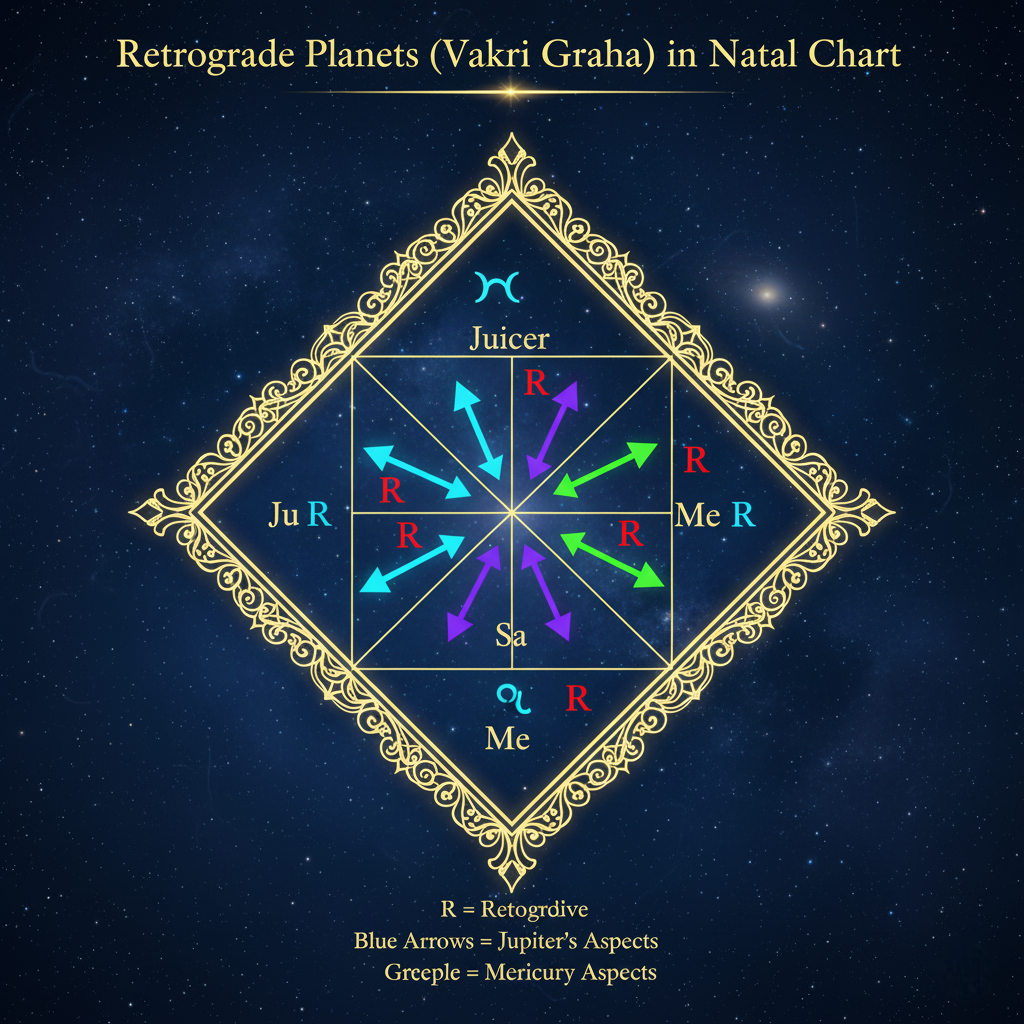
The Symbolism of Vakri Graha
Each Vakri planet behaves as though its energy turns inward. Imagine it as a teacher who pauses mid-lecture to reflect on their own lessons. You can’t ignore them — they’re often louder, more noticeable, and introspective in their influence.
In many classical texts like Brihat Parashara Hora Shastra, retrograde planets are described as being “strong” or “equivalent to exalted.” Yet, their results depend on context — house placement, sign, conjunctions, and aspects all modify how that inner intensity manifests.
Which Planets Can Go Retrograde?
Not all planets become retrograde. Here’s a quick guide:
| Planet | Can Go Retrograde? | Frequency | Duration |
| Sun | ❌ No | — | — |
| Moon | ❌ No | — | — |
| Mercury | ✅ Yes | 3–4 times a year | ~3 weeks |
| Venus | ✅ Yes | Once every 18 months | ~40 days |
| Mars | ✅ Yes | Every 2 years | ~2 months |
| Jupiter | ✅ Yes | Once a year | ~4 months |
| Saturn | ✅ Yes | Once a year | ~4.5 months |
| Rahu & Ketu | ✅ Always retrograde | Constant | — |
How to Identify Retrograde Planets in Your Birth Chart
Now, open your Vedic Kundli (from any astrology software or website).
- Look for an ‘R’ or ‘(R)’ beside a planet’s name — that indicates retrograde motion.
- Note the sign and house where the planet sits.
- Check for aspects and conjunctions. Retrograde planets strongly influence any planet they aspect or join.
💡 Tip: In South Indian charts, retrograde is often marked beside the planet symbol. In North Indian charts, you might need to hover your cursor (in digital charts) or read the planet list below the chart diagram.
Understanding the Effects of Retrograde Planets
Let’s explore the inner psychology of each retrograde planet — what happens when their energy turns inward.
1. Mercury Retrograde (Budha Vakri)
- Themes: Communication delays, tech issues, rethinking ideas.
- Effect: The mind turns reflective. Old contacts, projects, or thoughts may resurface.
- Remedy: Double-check all communication and avoid impulsive travel decisions.
2. Venus Retrograde (Shukra Vakri)
- Themes: Relationships, values, beauty, and finances.
- Effect: Deep emotional reassessment. Old lovers may reappear; new connections need caution.
- Remedy: Reflect on what you truly value, rather than seeking external validation.
3. Mars Retrograde (Mangal Vakri)
- Themes: Motivation, aggression, action.
- Effect: Anger may turn inward, creating frustration or physical tension. Productive for strategy and planning.
- Remedy: Channel energy through physical exercise or creative outlets.
4. Jupiter Retrograde (Guru Vakri)
- Themes: Wisdom, faith, expansion.
- Effect: A time for spiritual introspection. Beliefs are questioned and refined.
- Remedy: Study scriptures or philosophical texts. Reconnect with mentors.
5. Saturn Retrograde (Shani Vakri)
- Themes: Discipline, karma, responsibilities.
- Effect: Past karmic lessons resurface. You may have to rework unfinished duties or karmic debts.
- Remedy: Patience, perseverance, and self-accountability.
6. Rahu & Ketu (Eternal Retrogrades)
- Themes: Karmic patterns, obsession, detachment.
- Effect: Rahu retrogrades intensify desires; Ketu retrogrades deepen renunciation.
- Remedy: Meditation, detachment, and aligning your goals with dharma.
The Deeper Spiritual Meaning of Retrograde Motion
Opinion: Retrograde motion symbolizes an inner pilgrimage.
Reason: When planets appear to move backward, the universe invites you to pause and re-evaluate the area of life they govern.
Example: A retrograde Saturn in the 10th house may bring career delays not as punishment but as a test of endurance and maturity.
Restatement: Thus, retrogrades don’t block — they redirect you toward wisdom through introspection.
Retrograde Strength vs. Weakness
Many beginners assume that a retrograde planet is weak. But in Vedic astrology, this is a misconception.
In fact, classics say:
“Vakri graha bala vat bhavati” — a retrograde planet becomes powerful.
However, the direction of its energy changes. For example:
- It can give results out of sequence (delays, reversals).
- It can make you overthink or internalize its significations.
- It can create depth and mastery in the areas it governs.
So, a retrograde Jupiter may delay outward success but give profound inner wisdom.
Step-by-Step: How to Interpret a Retrograde Planet in Your Chart
Let’s make it practical:
- Identify the Retrograde Planet(s).
Example: Saturn (R) in Aquarius, 10th House. - Understand the Planet’s Natural Role.
Saturn = karma, discipline, hard work. - Assess the House and Sign.
10th house = career; Aquarius = innovation, service. - Blend the Meanings.
A retrograde Saturn in the 10th may indicate career delays early in life, but eventual mastery through perseverance. - Look for Aspects and Conjunctions.
If Mars aspects Saturn, it can create frustration or motivation depending on their dignity. - Check the Dasha (Planetary Period).
The retrograde planet’s true impact is most visible during its Dasha or Antardasha.
Common Misunderstandings About Retrograde Planets
Myth 1: “Retrograde means bad luck.”
Truth: Retrograde means inner focus, not misfortune.
Myth 2: “Retrograde planets don’t give results.”
Truth: They give results differently — more internally, often later, but deeply transformative.
Myth 3: “Retrogrades ruin relationships or jobs.”
Truth: They invite re-evaluation, helping you align with truth and authenticity.
Final Thoughts: Embracing the Power of Vakri Grahas
Every retrograde planet in your chart is an invitation to go within.
They represent unfinished karmic themes that you are revisiting to master.
Instead of fearing them, observe:
- Where do you feel “stuck” or “repeating”?
- What lessons keep resurfacing?
- Which planet is asking you to review your inner world?
When you align with their rhythm — reflection, patience, and maturity — retrograde planets become your greatest teachers.









